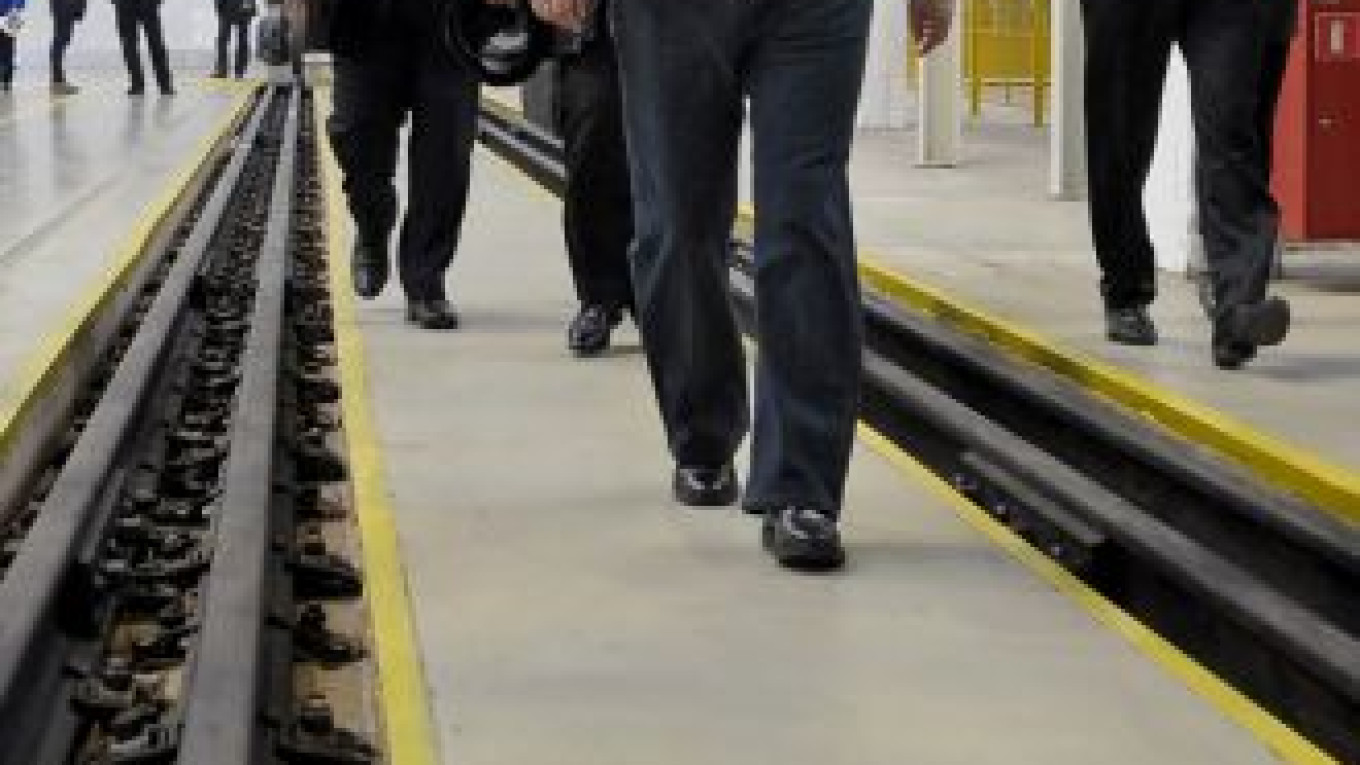Clad in a bomber jacket, Prime Minister Vladimir Putin walked briskly into a new railway car plant in Tikhvin recently to greet workers and push a button to launch production.
The tightly choreographed appearance at the factory 630 kilometers northwest of Moscow got top billing on all three Kremlin-controlled networks — and points to his campaign strategy as he tries to recapture the presidency in March.
With the urban middle class turning against him, Putin is focusing increasingly on his traditional blue-collar and rural support base, which tends to get all of its news from state television. Factory workers, farmers, public servants and the elderly form the backbone of the Russian leader's political following.
"The higher educated and the well-to-do tend to have a more critical attitude toward the government," said Alexei Grazhdankin, deputy head of the independent Levada Center polling agency. "They have more self-esteem, feel more involved in the political process and demand respect from the authorities."
Putin's troubles with the urban elites deepened dramatically recently as tens of thousands of Muscovites joined demonstrations to express outrage over fraud in December's State Duma elections.
Putin has cast the rally organizers as U.S. stooges working to weaken Russia and has tried to turn blue-collar workers against the urban protesters by portraying them as rich spoiled youth, contemptuous of the majority of Russian citizens.
"Never before has Putin taken the desperate step of stirring up confrontation in society under the slogan 'Russia against Moscow,'" said Lilia Shevtsova, a senior associate with the Carnegie Moscow Center. She and other analysts warn that such tactics could split society and raise tensions.
The news broadcasts of Putin directing the Tikhvin plant's opening are part of a daily pattern. Almost every evening, state television shows him meeting with pre-selected groups of ordinary Russians or giving orders to officials.
"It's intended to show that he is on top of things, follows all the developments, is always in charge," said Alexei Makarkin of the Center for Political Technologies, an independent think tank.
Putin's appearances also seem designed to show that all is well in the country as he seeks to win back the presidency on March 4 after four years as prime minister.
The pristine new plant in Tikhvin, for example, served to project an image of Russia as a future technological powerhouse, even though the economy continues to rely almost exclusively on exports of oil, gas and other raw materials.
The plant's workers were proud of their state-of-the-art robotic equipment and gleaming shop floors: "It's the most modern such plant not only in Russia, but in all of Europe," boasted worker Sergei Rozenbakh.
Even though the bulk of blue-collar workers continues to support Putin, a significant share backs the Communist and nationalist candidates and many are undecided. To win over wavering voters, Putin has countered the Communists with promises to impose new taxes on the rich; he has appealed to nationalist sentiment with a pledge to toughen migration rules.
Four other candidates are running for president, including three members of parliament who have run against Putin in the past and whose parties have reached an accommodation with the Kremlin.
The strongest of the bunch is Communist Party leader Gennady Zyuganov, but none of the veterans of past campaigns poses a serious challenge.
The only newcomer is billionaire businessman Mikhail Prokhorov, but his support is limited to liberal-minded voters in big cities. Prokhorov has avoided directly criticizing Putin, and many believe that the Kremlin approved his candidacy in the hope that it would provide a safe channel for opposition votes.
Opinion polls show Putin's ratings hovering below the 50 percent needed for a first-round victory in the March 4 election. If he fails to get a majority, he would face a runoff three weeks later.
Putin has refused to take part in debates.
"It would be very risky for him to engage in a dialogue, his electorate may see it as a sign of weakness," Grazhdankin said. "It could negatively affect his image, making it no longer sacred."
His strategy appears to be to rely on the powerful propaganda tool of television to consolidate his base.
"Those who might vote for Putin are all watching TV," Grazhdankin said. "He's addressing the mass audience, and the language he has chosen fits the purpose."
As for the opposition, Putin appears willing to allow them to express their discontent on the Internet and hold their rallies, a sharp change of tack from recent years, when anti-government protests were quickly and brutally dispersed by police.
Shevtsova predicted that Putin may resort to harsh measures after the vote.
"For now, his team is acting in white gloves, but after the March election we may expect them to toughen their policy and tighten the screws," she said.
A Message from The Moscow Times:
Dear readers,
We are facing unprecedented challenges. Russia's Prosecutor General's Office has designated The Moscow Times as an "undesirable" organization, criminalizing our work and putting our staff at risk of prosecution. This follows our earlier unjust labeling as a "foreign agent."
These actions are direct attempts to silence independent journalism in Russia. The authorities claim our work "discredits the decisions of the Russian leadership." We see things differently: we strive to provide accurate, unbiased reporting on Russia.
We, the journalists of The Moscow Times, refuse to be silenced. But to continue our work, we need your help.
Your support, no matter how small, makes a world of difference. If you can, please support us monthly starting from just $2. It's quick to set up, and every contribution makes a significant impact.
By supporting The Moscow Times, you're defending open, independent journalism in the face of repression. Thank you for standing with us.
Remind me later.


